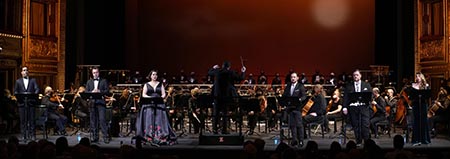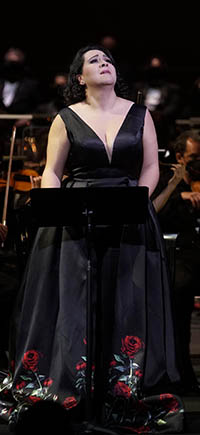
Marianela
Music: Jaime (Jaume) Pahissa
Libretto: Serafín and Joaquín Álvarez Quintero,
after the novel by Benito Pérez Galdós
Teatro de la Zarzuela
(Madrid, 27 November 2020)
review by Víctor Sánchez Sánchez
Marianela,
the opera
only to be seen at La Zarzuela
 Everyone here in Madrid has been thoroughly amazed to discover the music and drama of such a great opera as Marianela, previously completely unknown. At the end of the mere couple of performances, practically the entire audience expressed unanimous enthusiasm. Behind all this there are many mysteries. First of all, Jaime Pahissa himself is a great unknown. We have biographical references (Xosé Aviñoa’s exhaustive study) and we know his musical writings (such as that well-drawn biography of Falla, written in Argentina). Furthermore, Professor Emilio Casares – the true inspiration behind this project in many ways – has confirmed the importance of this opera. But who had heard any of Pahissa’s music? The almost total absence of recordings is surprising, especially after hearing such a masterwork as Marianela. Its musical resources are rich and varied: the inclusion of popular song in its original form, a rich Straussian orchestration, an extended harmonic language laden with intense expressivity and a fluent vocal realisation of the text – even a surprising hint of avant-garde expressionism, at the crucial moment of the work when Pablo recovers his sight.
Everyone here in Madrid has been thoroughly amazed to discover the music and drama of such a great opera as Marianela, previously completely unknown. At the end of the mere couple of performances, practically the entire audience expressed unanimous enthusiasm. Behind all this there are many mysteries. First of all, Jaime Pahissa himself is a great unknown. We have biographical references (Xosé Aviñoa’s exhaustive study) and we know his musical writings (such as that well-drawn biography of Falla, written in Argentina). Furthermore, Professor Emilio Casares – the true inspiration behind this project in many ways – has confirmed the importance of this opera. But who had heard any of Pahissa’s music? The almost total absence of recordings is surprising, especially after hearing such a masterwork as Marianela. Its musical resources are rich and varied: the inclusion of popular song in its original form, a rich Straussian orchestration, an extended harmonic language laden with intense expressivity and a fluent vocal realisation of the text – even a surprising hint of avant-garde expressionism, at the crucial moment of the work when Pablo recovers his sight.
The work is based on a good libretto, which always functions well and adequately condenses Galdós's drama/novel. In reality it is one of the Spanish writer’s least typical works, due to its sentimental background, but perhaps that very reason makes it a good candidate for lyric transformation. The libretto starts from the theatrical version, logically abbreviated and condensed by the Quintero brothers from the original novel. Pahissa concentrates it, to build an opera of solid musical dramaturgy, in modern style, straightforwardly developed to suit operatic aesthetics.
 As befits a post-Wagnerian opera, the vocal parts are very demanding, especially for the leading couple, Marianela and Pablo. We should remember that the 1923 premiere at Barcelona’s Liceu was sung by the soprano Fidela Campiña and tenor José Palet, singers with fine lyrical-spinto voices who enjoyed extensive international careers: among Palet’s historical recordings we hear fragments of Lohengrin, The Valkyrie and The Mastersingers (as well as Radamès and Othello), while the soprano played such roles as Wagner’s Isolde and Margarita in Mefistofele at La Scala. It cannot have been easy to cast this revival, but Teatro de la Zarzuela found two magnificent singers for these roles. The young Guatemalan soprano Adriana González, winner of Operalia in 2019, perfectly embodied the title character with her beautiful voice and careful phrasing, while the Asturian tenor Alejandro Roy creditably met demands of amplitude and range, in a part full of difficulties. In their solos – better styled monologues than arias, considering their formal freedom – they skilfully quarried all the necessary intensity, from Marianela’s tensions after learning of the possibility of a cure of her beloved’s blindness, to the exalted brilliance of the moment where Pablo discovers the light, at the beginning of Act 3. One of the most memorable moments was their duet at the end of Act 1, with its Tristanesque accents.
As befits a post-Wagnerian opera, the vocal parts are very demanding, especially for the leading couple, Marianela and Pablo. We should remember that the 1923 premiere at Barcelona’s Liceu was sung by the soprano Fidela Campiña and tenor José Palet, singers with fine lyrical-spinto voices who enjoyed extensive international careers: among Palet’s historical recordings we hear fragments of Lohengrin, The Valkyrie and The Mastersingers (as well as Radamès and Othello), while the soprano played such roles as Wagner’s Isolde and Margarita in Mefistofele at La Scala. It cannot have been easy to cast this revival, but Teatro de la Zarzuela found two magnificent singers for these roles. The young Guatemalan soprano Adriana González, winner of Operalia in 2019, perfectly embodied the title character with her beautiful voice and careful phrasing, while the Asturian tenor Alejandro Roy creditably met demands of amplitude and range, in a part full of difficulties. In their solos – better styled monologues than arias, considering their formal freedom – they skilfully quarried all the necessary intensity, from Marianela’s tensions after learning of the possibility of a cure of her beloved’s blindness, to the exalted brilliance of the moment where Pablo discovers the light, at the beginning of Act 3. One of the most memorable moments was their duet at the end of Act 1, with its Tristanesque accents.
 The rest of the cast also offered vocal luxury: the bass Simón Órfila’s solid Patriarch, Doctor Golfín’s subtle, lyrical nuances from the baritone Luis Cansino, supported by the precise interventions of Paola Leguizamón as Florentina and María José Suárez in the miners’ song. Maestro Óliver Díaz handled all the instrumental and vocal complexity admirably, supporting the singers well and maintaining dramatic continuity – all the greater a merit, given the difficulty caused by the extreme separation of the performers imposed by the pandemic, which led to expansion of the modest theatre stage by removal of the first five rows.
The rest of the cast also offered vocal luxury: the bass Simón Órfila’s solid Patriarch, Doctor Golfín’s subtle, lyrical nuances from the baritone Luis Cansino, supported by the precise interventions of Paola Leguizamón as Florentina and María José Suárez in the miners’ song. Maestro Óliver Díaz handled all the instrumental and vocal complexity admirably, supporting the singers well and maintaining dramatic continuity – all the greater a merit, given the difficulty caused by the extreme separation of the performers imposed by the pandemic, which led to expansion of the modest theatre stage by removal of the first five rows.
An event like this will be remembered as a moment of historical importance. We must salute Teatro de la Zarzuela, especially its director Daniel Bianco, for maintaining the commitment to promote revivals of Spanish repertoire – no easy task, given the organizational conditions of a theatre that depends on ministerial bureaucracy, especially in the face of a pandemic. If it is a miracle to present opera and music under Covid (we should remember what is happening in such great international centres as La Scala, Vienna State Opera or the New York Metropolitan) it is even more so to present a revival of an unknown work, honoured with great artistry.
It is surprising to find that Pahissa composed many other operas: Gala Placidia (1913), La Morisca (1919) and La princesa Margarida (1928) all premiered at the Liceu. That was a time when local flowers bloomed naturally in the programmes of the theatre in Las Ramblas, with many other operas, such as those by Enric Morera (Emporium, Bruniselda, Titaina and Tassarba), Hesperia by Lamote de Grignon, Nerón by Joan Manén – and the posthumous revival of Vives’s Euda d’Uriach in 1934, an opera mounted in 1900 before the composer moved to Madrid and focussed his career on zarzuela. This is no mere scholarly list, but a catalogue of works of considerable interest, which were appreciated in their time. From this group, Marianela also enjoyed some international exposure, being presented at the Teatro Colón in Buenos Aires during 1946, after Pahissa moved to Argentina.

That native opera flourished, no one can doubt, except through ignorance or lack of interest. Despite this, today’s Spanish opera houses have nothing to do with it: neither the Liceu nor Madrid’s Teatro Real have shown even minimal interest in artistic endeavours such as this Marianela. We must not cease denouncing the laziness of theatres that, under the protection of foundations, operate mainly with public funds – of course much larger ones than those managed by Teatro de la Zarzuela – and which should not ignore opportunities to do cultural service, by searching for gaps between their endless Don Giovannis and Traviatas to bring to light works such as this. This is not a matter of national pride, but of belief in the genre and its riches. Just as the operatic repertoire is enriched by Czech works like Rusalka, many of these Spanish operas would cause surprise.
These opera houses have been oblivious to ‘el año Galdos’, the centenary of his death in 1920, not realising that they had such a work to hand as Marianela. The writer was a great lover of music, who worked in his early days as a critic at the Teatro Real, which appears in many of his novels. At least Teatro de la Zarzuela has not missed the opportunity to show that this opera ought to be staged sometime soon. Sadly, its presentation in the theatre has been somewhat ephemeral, as no recording has been scheduled – or even a single broadcast. This is not the fault of Teatro de la Zarzuela, but of other institutions such as RTVE and the Ministry of Culture itself. But let’s not lose hope, instead congratulating ourselves on the rediscovery of a great opera, on a text by one of our great novelists. For music lovers at least, this has been the great moment of this ‘Galdós Year’.
© Víctor Sánchez Sánchez and zarzuela.net, 2020
Cast: Adriana González (Marianela), Alejandro Roy (Pablo), Paola Leguizamón (Florentina), Luis Cansino (Doctor Teodoro Golfín), Simón Orfila (El Patriarca de Aldeacorba), César Méndez Silvagnoli (El padre de Florentina), María José Suárez (Mariuca), Mario Villoria (Gasparuco). Coro Titular del Teatro de la Zarzuela. Orquesta de la Comunidad de Madrid. c. Óliver Díaz. |
 |
![]() en español
en español
![]() homepage - zarzuela.net
homepage - zarzuela.net
4/XII/2020